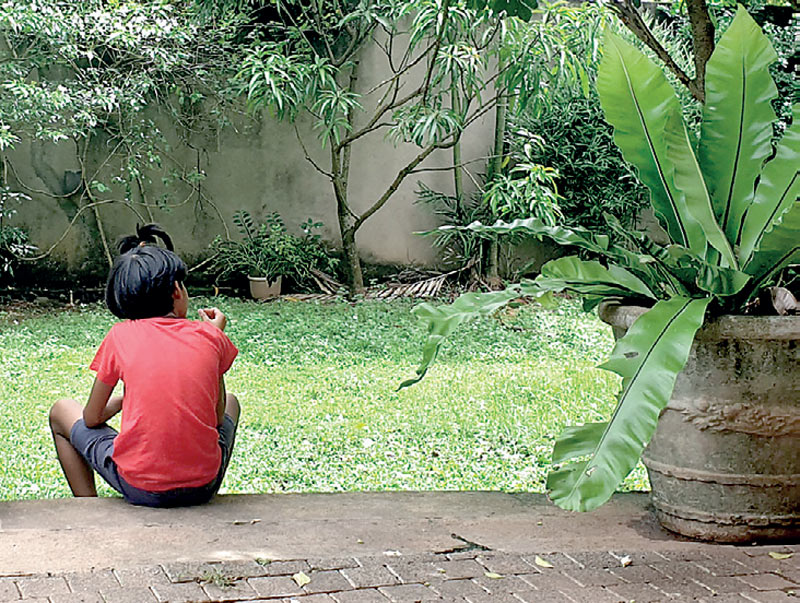Tuesday Feb 24, 2026
Tuesday Feb 24, 2026
Friday, 7 January 2022 00:00 - - {{hitsCtrl.values.hits}}

Studies show that exposure to nature can benefit autistic children in many cases
 As the name indicates, autism spectrum disorder (ASD) is a neurodevelopmental disorder encompassing a range of conditions. At one end of the spectrum, people with high-functioning autism can be able to live largely independent lives with minimal support; on the other end, those who are high on the spectrum often require substantial support and may never be able to live independently.
As the name indicates, autism spectrum disorder (ASD) is a neurodevelopmental disorder encompassing a range of conditions. At one end of the spectrum, people with high-functioning autism can be able to live largely independent lives with minimal support; on the other end, those who are high on the spectrum often require substantial support and may never be able to live independently.
The most common characteristics of autistic children and adults are difficulties in communication, difficulties in social interaction, and repetitive behavioural patterns. This can include a lack of language skills (up to being completely non-verbal), challenges in establishing or maintaining relationships, heightened or reduced sensitivity to sounds, lights, or temperature, insistence on routines, repeating certain words or phrases (echolalia), lack of understanding of joint attention, lack of symbolic play skills, hand “flapping”, sleep problems, hyperactivity, or attention deficits.
There is no definite number of autism cases in Sri Lanka, as there is currently no population-based screening program, and autism screening is not a mandatory part of primary healthcare. A 2009 study found an autism prevalence of 1.07%, or roughly 1 in 93 children—however, considering the study’s limited sample size, the actual number might be different.
Research has found that the development of autistic children can benefit from interventions such as communication therapy, behavioural therapy, or occupational therapy, with an earlier start and more regular sessions leading to better results. Furthermore, training parents and other caregivers can improve the outcomes of other interventions. For this reason, it is important to look at autism spectrum disorder from a holistic perspective, which includes the perspective of the child and the parents to identify interventions that benefit both parties.
The child’s perspective
Many children on the autism spectrum find it difficult to socialise, communicate, and form lasting connections. This can lead to emotional stress, social isolation, anxiety, feelings of loneliness, and even depression, as well as make it harder for them to participate in society and daily life. Autistic children may not be able to functionally play on their own or keep up with school studies at the level expected for their age, especially if they are largely or completely non-verbal. It is well-documented that autistic children can also develop repetitive “stimming” behaviours that are hard to unlearn, outlasting the usual development stages and being carried over into adulthood.
Despite these issues, children with ASD can live fulfilling and productive lives if they receive adequate support. In some cases, autistic children are very good at repetitive tasks, retain detailed memories for a long period of time, or excel in disciplines such as math, sciences, IT, or music. Even if that is not the case, early and continued interventions have been shown to positively influence their development and help them develop better social and communication skills.
Research shows that key measures to support autistic children include providing structure, reliable schedules, and access to adequate education and therapeutic interventions. Specialised services, such as special education, speech therapy, and physical therapy, give children a better chance to improve. However, the home environment, accommodation in public spaces, and interactions with other children and adults are formative as well.
The parent’s perspective
It is important to acknowledge and address the needs of autistic children, which may require constant attention and supervision, therapy, and assistance to participate in the education system, often leading to additional financial and caregiving responsibilities. However, parents of autistic children may need support as well, especially if they are in an environment with limited resources, capacities, awareness, and understanding of ASD.
After coming to terms with the diagnosis of ASD, parents have to find ways to structure their life and provide routines. While the situation with the child changes and responsibilities are added, parents still need to function and fulfil their other duties and responsibilities. These double or triple responsibilities can be challenging to manage, and if parents feel unable to cope with their children’s behaviours and needs, it can negatively affect their own physical and mental health.
A recent study among Sri Lankan parents of autistic children, which was published in the Sri Lanka Journal of Child Health in March 2021, highlights common experiences of emotional stress, being scared, worrying for the child’s future, perceived stigma, and troubled marital relationships. Parents reported feeling overwhelmed by the higher financial and caregiving responsibilities, especially in combination with low awareness, understanding of autism, and outside support. Parents also mentioned positive aspects, such as the child strengthening family relationships or their close relationship with the child.
There are low-cost options that can significantly improve the life of children and their parents. For example, research has established the efficacy and feasibility of training parents for home-based interventions, either as support or even as full-time therapists. Furthermore, parents can work on developing stress management habits and relaxation exercises and try to retain some amount of breathing room and personal time. It might be beneficial to safety-proof the home, establish family traditions and activities that structure leisure time, and organise schedules more effectively. Networking with other parents and finding or establishing support groups can also have a notable impact and help parents to address both their children’s and their own needs.
Autism spectrum disorder will change the life of children and their parents, but it does not have to define or limit them. Beyond the individual level, there is a broader societal perspective. Society can create an enabling environment for both parents and autistic children to be accepted, integrated, and supported. Statistically, tens or even hundreds of thousands of Sri Lankans are likely to be affected by autism from infancy through adulthood, and society as a whole—not only parents, doctors, and teachers—has a role to play in integrating them.
If awareness of ASD can be further spread and autism screening included in routine childhood healthcare, actions can be taken earlier and more effectively. Enhanced medical resources for early detection as well as autism acceptance among the wider public could go a long way towards removing stigmatisation and creating inclusive spaces for children and adults with ASD.
(The writer works as Director – Research and Knowledge Management at SLYCAN Trust, a non-profit think tank based in Sri Lanka. He holds a master’s degree in Education from the University of Cologne, Germany, has worked with autistic adults in Germany, and is a parent of an autistic child. Besides autism and education, his work also focuses on climate change and related issues, and he is a regular writer to several international and local media outlets.)